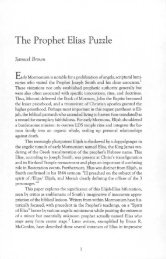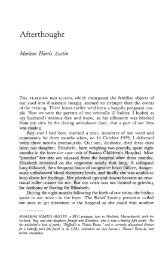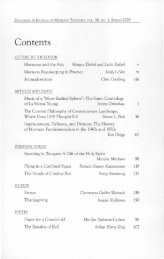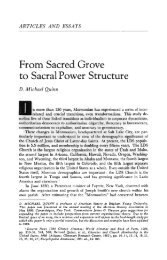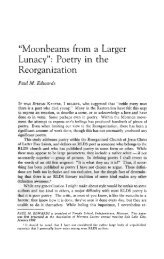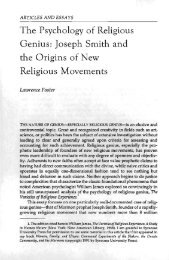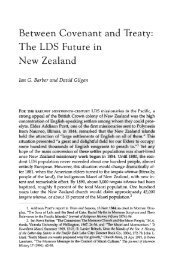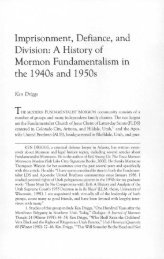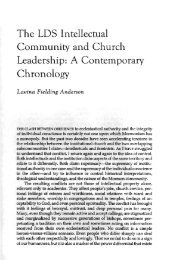Dialogue, Volume 25, Number 2 - Dialogue – A Journal of Mormon ...
Dialogue, Volume 25, Number 2 - Dialogue – A Journal of Mormon ...
Dialogue, Volume 25, Number 2 - Dialogue – A Journal of Mormon ...
You also want an ePaper? Increase the reach of your titles
YUMPU automatically turns print PDFs into web optimized ePapers that Google loves.
100 DIALOGUE: A JOURNAL OF MORMON THOUGHT<br />
doing more needed work by being designated the Sunday School presidency.<br />
Their job seems to consist <strong>of</strong> staffing the adult and youth classes,<br />
and conducting the ridiculous veriform appendix <strong>of</strong> song practice, a<br />
ten-minute meeting sutured to its unwilling host, sacrament meeting.<br />
Staffing, however, is where the institutional rubber really hits the<br />
rocky road <strong>of</strong> reality. During my eight years as a Sunbeam teacher, I<br />
can remember nine presidencies. The problems <strong>of</strong> continuity, training,<br />
and experience are obvious, just from the math. Given the demographics<br />
<strong>of</strong> our ward, staffing would be a problem anyway; but I remember<br />
one gruesome week when the Primary president conducted, led<br />
the singing, did sharing time, and taught the Merrie Miss class. One<br />
counselor was covering the nursery, the other counselor was absent,<br />
and the secretary hadn't come either. (We had four secretaries within<br />
one three-month period.) I was teaching Sunbeams but was also pressed<br />
into service as organist.<br />
It was not uncommon during one period for two sisters who were<br />
teaching a class <strong>of</strong> about eight children and a class <strong>of</strong> fourteen children<br />
respectively to simply not show up. I kept track one winter, and they<br />
averaged such unannounced absences one Sunday a month, or <strong>25</strong> percent<br />
<strong>of</strong> the time. The overburdened presidency's solution was to smile<br />
apologetically at the teachers <strong>of</strong> the classes just older and younger and<br />
ask, "Would you mind if the children came in with you today?" The<br />
presidency thus enabled the irresponsible teachers and burdened the<br />
responsible ones with the consequences. The responsible teachers also,<br />
by rising to the emergency, became enablers for a passive presidency.<br />
I was not surprised when these responsible teachers were gone by<br />
summer. When I asked the president why the two notoriously unreliable<br />
teachers were not replaced, she answered helplessly: "It's so hard<br />
to find teachers and get them approved."<br />
She was saying no more than the truth. When my husband, Paul,<br />
a new counselor in the bishopric, went out on his first assignment to<br />
find a Primary teacher, six women straight in a row turned him down<br />
for a variety <strong>of</strong> reasons. They didn't like Primary. It was too hard. It<br />
isolated them from the other women in the ward. They didn't like children.<br />
They did not say, but I'm sure some felt, that it was also not a<br />
very "important" calling. I realize that Primary has no monopoly on<br />
teaching problems or inadequate staffing, but I suspect its low status in<br />
the hierarchy makes staffing particularly troublesome. Furthermore,<br />
many adults do not relate well to children, can't get them to behave,<br />
and don't know how to teach children effectively.<br />
According to my observations, the best teachers in our Primary<br />
are parents concerned about their own children. That's why both Paul<br />
and I are currently in the Primary. I started teaching Sunbeams when








